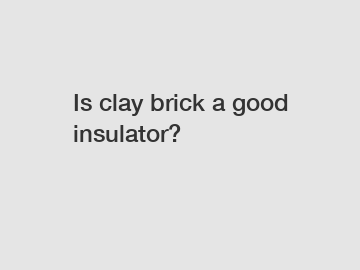Dec. 29, 2023
Minerals & Metallurgy
If you want to learn more, please visit our website YT.
Is Clay Brick a Good Insulator?
When it comes to building materials, choosing the right ones can significantly impact the energy efficiency and insulation of a structure. One widely used material in construction is clay brick. However, some debate surrounds whether or not clay brick is a good insulator. In this article, we will explore the factors that affect the insulation properties of clay brick and determine if it is indeed a suitable choice for thermal insulation.

Factors Affecting Insulation Properties:
1. Thermal Conductivity:
Thermal conductivity refers to the ability of a material to conduct heat. In the case of clay brick, it has relatively high thermal conductivity compared to other insulating materials such as foam or mineral wool. This means that clay brick allows heat to move through it more easily, resulting in less effective insulation.
2. Density:
The density of clay brick also plays a role in its insulation properties. Typically, clay brick has a high density, which reduces its ability to block heat flow. Dense materials tend to store more heat and have less resistance to thermal transfer.
3. Moisture Absorption:
Clay brick has a natural tendency to absorb moisture, which can affect its insulation performance. When wet, the thermal conductivity of brick increases, decreasing its insulating capacity. Additionally, moisture can cause brick to deteriorate over time, further affecting its insulation properties.
4. Thermal Mass:
Despite its relatively low insulating properties, clay brick can contribute to the concept of thermal mass. Thermal mass refers to a material's ability to store and release heat slowly. Clay brick has a high thermal mass, which means it can absorb heat during the day and release it at night, helping to stabilize indoor temperatures. While this aspect does not qualify clay brick as an insulation material per se, it can assist in regulating temperature fluctuations within a building.
Conclusion:
Considering the factors mentioned above, it becomes evident that clay brick is not a good standalone insulator. Its thermal conductivity and density hinder its ability to effectively block heat transfer. However, it is worth noting that clay brick can still provide some benefits when used in combination with other insulation materials or as part of a larger thermal mass strategy.
In real-world scenarios, employing clay brick along with additional insulation measures can help improve energy efficiency and reduce heating and cooling costs. Utilizing techniques such as cavity wall insulation or incorporating insulating materials within the brickwork can enhance the overall thermal performance of a structure.
While the insulating properties of clay brick may not be exceptional, it remains a widely used and durable building material with other desirable attributes. Its aesthetic appeal, fire resistance, and ability to regulate temperature fluctuations through thermal mass make it an attractive option for many construction projects.
In conclusion, clay brick is not the ideal choice if the primary goal is achieving high insulation performance. However, when used strategically and in combination with other insulation methods, it can contribute to the overall insulation capabilities of a building. To learn more about insulation options or discuss your specific needs, feel free to contact us.
(Contact us for further inquiries or to discuss your insulation needs.).
Click here to get more.
The company is the world’s best Fireclay Brick Recipe supplier. We are your one-stop shop for all needs. Our staff are highly-specialized and will help you find the product you need.
Previous: Discover the Benefits of Bulk Fibrolite Powder: The Ultimate Solution to Your Construction Needs!
Next: Which ASTM A179 Seamless Steel Pipe has the best price?
If you are interested in sending in a Guest Blogger Submission,welcome to write for us!
All Comments ( 0 )